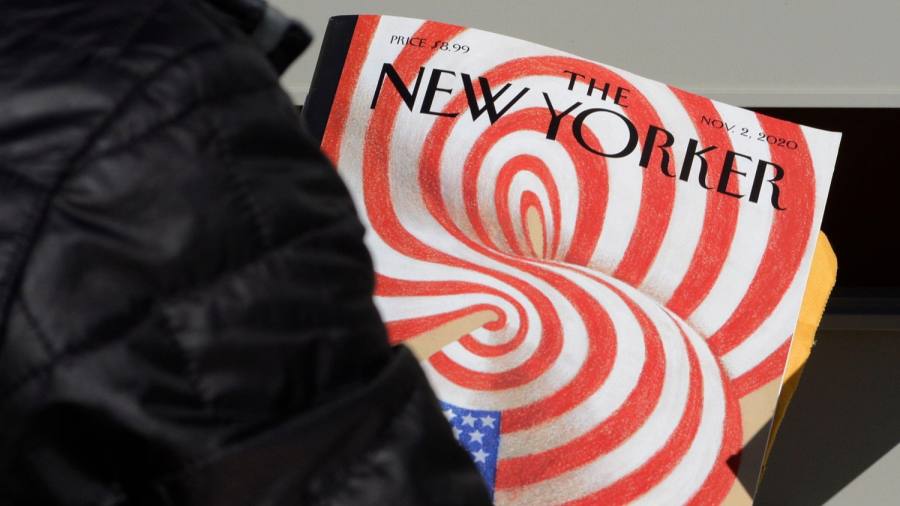Receive free Life & Arts updates
We’ll send you a myFT Daily Digest email rounding up the latest Life & Arts news every morning.
Years ago, before he took the Russian petrodollar, Gerhard Schröder was the guest speaker at a conference of Britain’s Labour party. In the lag between each sentence and its translation, members of the audience competed to laugh (if he had made a joke) or cheer (if he had made a solemn point) to show they understood German. Ostentatious, I know. But of the time. You see, back then, a British liberal was, or meant to be: abreast of continental politics, claret-drinking, Tuscan or Provençal in their summer travel plans. The whole mental orientation was Europe.
This didn’t, or didn’t always, mean anti-Americanism. But there was an awareness of the US as Other, in its expectations of the state, its geographic separateness, its religiosity.
How did that polite detachment from America turn into what is now total, cringing, round-the-clock absorption in its public life? Leave aside the “woke” thing. Even middle-of-the-road liberals in Britain live in a world of Daily Show clips and piled-up copies of the New Yorker. This wasn’t happening a generation ago. And the photo negative of it is a serene incuriousness about the mental life of their own continent. When did something European last penetrate the British cognoscenti? Prime-era Michel Houellebecq? Or the Scandinavian TV dramas? This is a Brexit of the mind.
And of the tongue. “Elton John is living his best life and I’m here for it!” How lost do you have to be as a British adult, how impressionable, to speak like this? Or to say “oftentimes”, “at this point”, “not OK”? There was a fine essay (as it happens, in the New Yorker) about the protean richness of multicultural London slang. How odd that some people in the same city prefer to converse, and tweet, in the register of an Amherst common room.
This Americanisation would be easier to understand if the US were an ever mightier force in the world. But it has a smaller share of global output than it did in 2001, when I heard Schröder speak. The dollar accounts for a lower share of currency reserves. America’s military now has a rival worth losing sleep over. There is less cause, not more, to face west. Yet America’s psychic hold on the British bien pensant has tightened over the period.
Last week, breaking my policy against west London, I attended the launch of Tomiwa Owolade’s This Is Not America in Holland Park. Its argument — that US race relations don’t map on to Britain’s — has needed saying for years. The prose has the tranquillity that doesn’t tend to come, if at all, until middle age. (The author is in his twenties.) And so the book deserves to succeed in its central mission.
It has no chance, of course. Something has changed in liberal Britain, and it predates Brexit. All my life, it was the right that was immersed in Americana. The left has joined them. There is nothing in this for the US. First, being obsessed with America is not the same as being pro-American. British liberals still disagree with the US line on Israel and much else. They just do so with a rising vocal tone at the end of each sentence.
Second, the temperature of US politics is high enough, without foreigners gawping into the fishbowl. What an awkward predicament for a nation: to be scrutinised as thought it were a unique world power while having the actual clout of just one of two, and in time, depending on India, perhaps three.
So, no, I didn’t see what Colbert said about that thing last night. No, I am not caught up with Pod Save America. I recognise no US TV anchors except the one on CNN with the lovely sad eyes. And I lived there for four years. In fact, I have friends from Virginia to Venice who are less across the politico-media life of their own republic than some people in De Beauvoir Town. Compatriots: this behaviour is weird. And unbecoming.
Perhaps a great power’s cultural influence, like an ageing gigolo’s charm, is the last thing to go. Long after Britain lost its might, there were people in Hong Kong and Zimbabwe moaning about their servants and describing things as “just not cricket” in a way no one in England had done since 1913. Plus anglais que les anglais, was the phrase for these tragicomic people and their affectations. How things come round. Don’t be more American than the Americans.
Email Janan at [email protected]
Read the full article here




